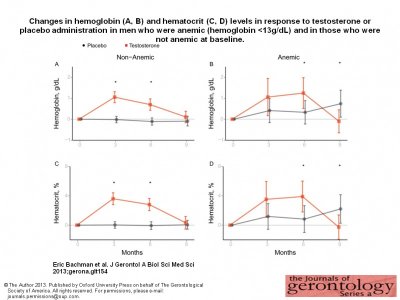ManOnMission
Member
48 year old male. On HCG and Testosterone for TRT. Hematocrit levels were getting too high.
Did 2 blood donations in 30 days (on 5/5 and 5/23).
On 5/30 did blood tests. Went from Hematocrit 58 down to 47.5 and Hemaglobin now 15.9 (which is good). But, Ferritin dropped to 18 (range is 21 to 274). DHEA 48.3 (low: 70-495 range), Glucose Serum (high: 103), Estradiol (High 65)..put on Anastrazole)
Been told to start taking Ferrous Fumarate Iron 29 mg 2 times per day (58 mg per day) plus Vitamin C to get Ferritin levels up. Then give next blood donation on 6/21
Wont this raise my H&H levels too? Does this sound right? (Im guessing the 2 blood donations back to back tanked my ferritin levels). I finally got my H&H levels down and now it sounds like they will be jacked back up. Is this a decision of what is more important, Ferritin or H&H?
Next Labs 7/15
New Program based on last test results:
Iron Supplement 2 x per day (added)
Vitamin C: 500 mg per day (added)
Test Cyp 60 mg 2 x per week (changed for 100 mg per week)
Anastrazole: ½ mg 2 times per week (same day as test cyp)
HCG daily 10ML per day
Did 2 blood donations in 30 days (on 5/5 and 5/23).
On 5/30 did blood tests. Went from Hematocrit 58 down to 47.5 and Hemaglobin now 15.9 (which is good). But, Ferritin dropped to 18 (range is 21 to 274). DHEA 48.3 (low: 70-495 range), Glucose Serum (high: 103), Estradiol (High 65)..put on Anastrazole)
Been told to start taking Ferrous Fumarate Iron 29 mg 2 times per day (58 mg per day) plus Vitamin C to get Ferritin levels up. Then give next blood donation on 6/21
Wont this raise my H&H levels too? Does this sound right? (Im guessing the 2 blood donations back to back tanked my ferritin levels). I finally got my H&H levels down and now it sounds like they will be jacked back up. Is this a decision of what is more important, Ferritin or H&H?
Next Labs 7/15
New Program based on last test results:
Iron Supplement 2 x per day (added)
Vitamin C: 500 mg per day (added)
Test Cyp 60 mg 2 x per week (changed for 100 mg per week)
Anastrazole: ½ mg 2 times per week (same day as test cyp)
HCG daily 10ML per day
Last edited by a moderator:

















